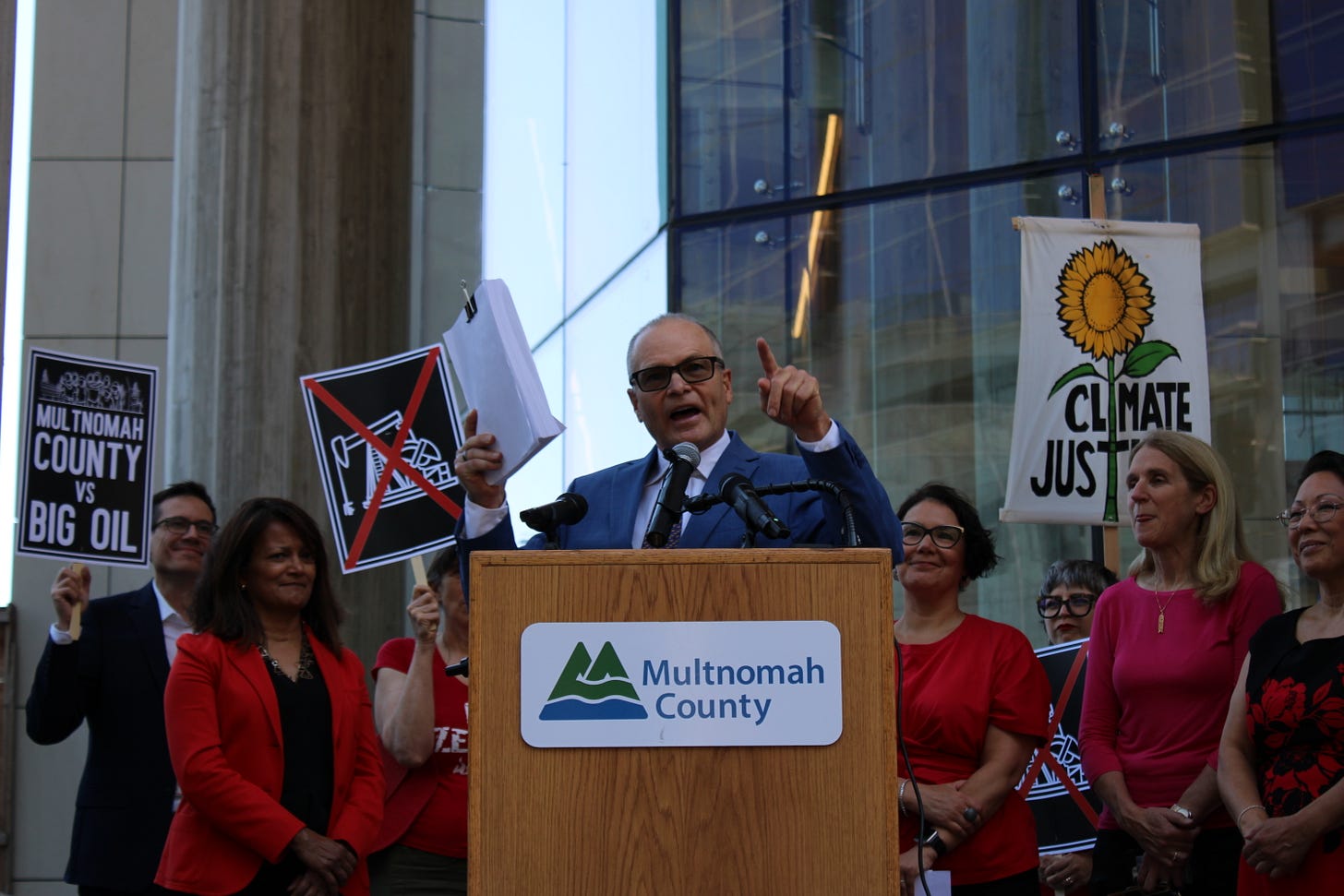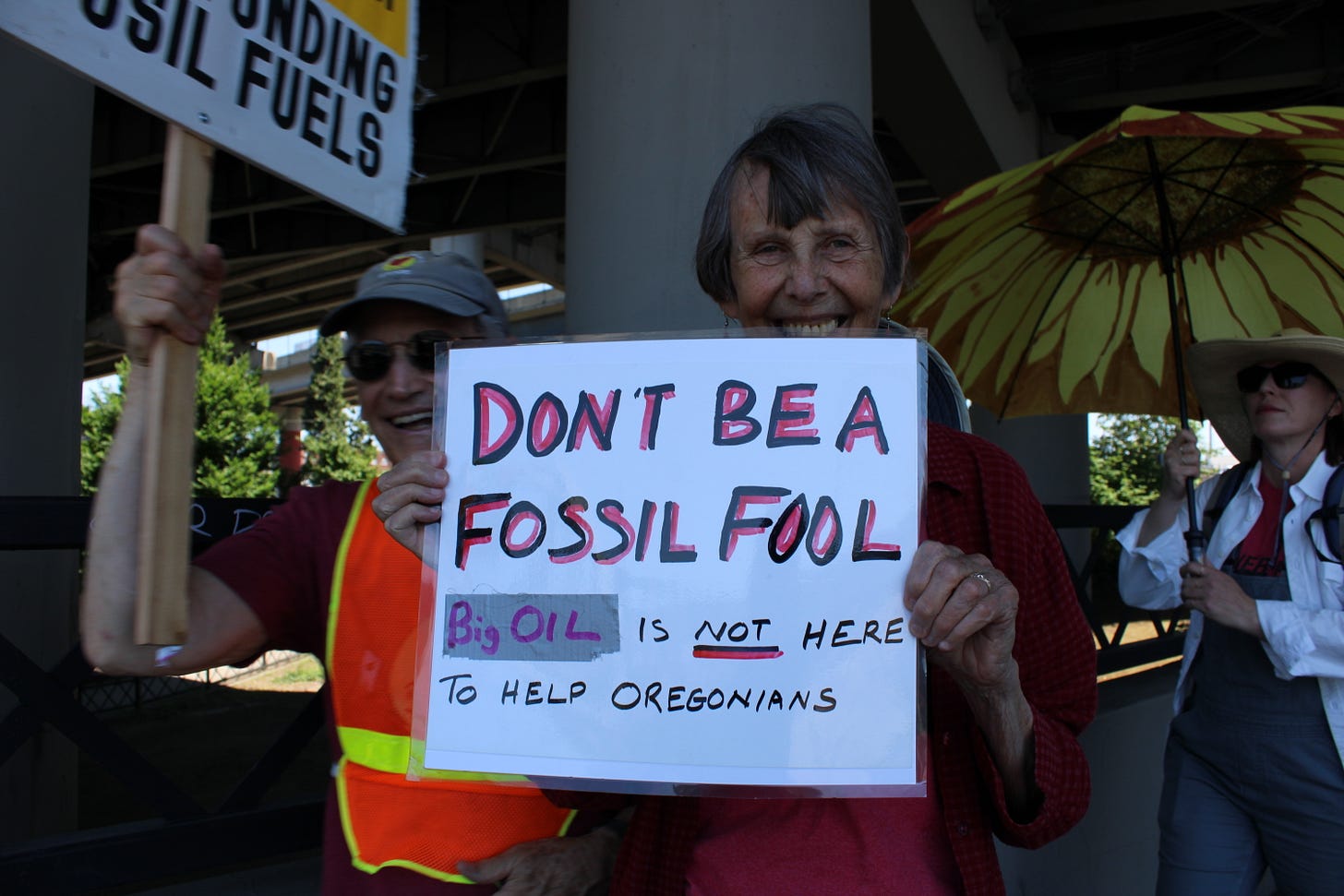A heat dome killed their residents. Now they’re suing Big Oil.
Multnomah County, Oregon, aims to put fossil fuel companies on trial for fueling climate disasters like the deadly 2021 heat dome.
Emily Sanders is the Center for Climate Integrity’s editorial lead. CCI staff writer Isabella Garcia, a Multnomah County resident, contributed to this reporting.
As we approach the second anniversary of a deadly heat dome that devastated communities throughout the Pacific Northwest, an Oregon county is now suing Big Oil companies and their enablers to hold them accountable for the damage. Multnomah County is the first community to file a climate accountability lawsuit over the heat dome — which officials say killed 69 local residents, scientists say was “virtually impossible” without climate change, and county leaders say was fueled by the fossil fuel industry’s fraud.
Multnomah is charging some of the largest oil, gas, and coal companies — including Exxon, Chevron, Shell, BP, Koch Industries, Peabody, and others — with lying to “the County, the public, and the scientific community about the catastrophic harm” they knew fossil fuels would cause. The industry’s campaigns of disinformation, they say, delayed climate action for years and left residents to pay the ultimate price while the companies rake in record-breaking profits.
Like numerous other lawsuits filed in the United States to hold fossil fuel, tobacco, opioid, and other industries liable for damages they knowingly caused, Multnomah’s case charges the industry with violating fraud and tort laws, like negligence and public nuisance. The lawsuit says Big Oil should face a jury trial and pay more than $51.5 billion to help the county adapt and cover the costs of past and future climate disasters, including more frequent and extreme heatwaves and wildfires.
After voting yesterday afternoon to take legal action against Big Oil, county officials led hundreds of local residents and climate activists on a march to the Multnomah County Courthouse, where they held a press conference announcing the suit.
“The climate crisis is costing us money today, and will cost us more money in the future as we try to adapt,” Multnomah County Chair Jessica Vega Pederson said during the press conference Thursday. “We’re not looking for a payout, we’re looking to be paid back.”

Here are the highlights:
Multnomah experienced one of the deadliest climate disasters in U.S. history — and they say Big Oil should help pay for the damage.
In June 2021, the Pacific Northwest found itself trapped under an unrelenting heat dome, a phenomenon during which hot air remains in the atmosphere for several consecutive days and nights. In Multnomah County, temperatures rose to 108°, 112°, and 116°Fahrenheit — heat extreme enough to shut down bodily functions. Sixty nine people in the county lost their lives as a result — more heat deaths than have occurred in the entire state of Oregon over the past two decades.
“These were some of the most vulnerable people in Multnomah County, and in 2021 they paid the price that Big Oil ought to be covering for in our communities with their lives,” said Vega Pederson during the county commission’s board meeting introducing the lawsuit.
That harm wasn’t equally distributed, Vega Pederson explained: the elderly, those living alone, those experiencing homelessness, and people living in lower-income neighborhoods without air conditioning made up the majority of the county’s deaths.
Major oil and gas companies and their trade associations, the lawsuit argues, carried out a “scheme to rapaciously sell fossil fuel products and deceptively promote them as harmless to the environment, while they knew that carbon pollution emitted by their products into the atmosphere would likely cause deadly extreme heat events like that which devastated Multnomah County in late June and early July 2021.” Now the county, which experienced three times the typical annual amount of emergency visits from heat-related illness in one week and scrambled to open cooling centers and offer other life-saving provisions during the heat dome, says Big Oil should pay to protect its residents from future extreme heat events.
It’s the first time the oil industry has faced legal action for its role in causing an individual heat wave, which was made at least 150 times more likely by climate change, according to a peer reviewed study. The new charges are reflective of a growing field of attribution science, which can link disasters to climate change and even individual polluters.

The case charges new defendants with climate deception.
Multnomah County is suing at least two new defendants that haven’t yet appeared in other climate accountability cases: the Western States Petroleum Trade Association, and the notorious consulting firm McKinsey and Company, which the suit says aided the fossil fuel companies in their efforts to “sow ‘scientific’ and public doubt in furtherance of their ceaseless, ravenous quest for more wealth.”
McKinsey is a global consulting firm that has worked with at least 43 of the world’s largest polluters and made tens of millions in profits from two of the biggest offenders — top clients Chevron and Saudi Aramco, according to the complaint. “McKinsey’s claims of commitment to environmental protectionism stand in stark contrast to the millions of dollars it has earned assisting its fossil fuel and mining company clients in promoting themes to deny the existence and/or gravity of [anthropogenic climate change]”, the lawsuit reads.

Western States Petroleum Association (WSPA) is the oldest petroleum trade association in the U.S., which represents fossil fuel companies operating in Arizona, California, Nevada, Oregon, and Washington. WSPA members include Exxon, Shell, Chevron, and BP, and the group “has engaged in a climate deception/misinformation campaign in Oregon to continue to further the business objectives of its carbon polluting members,” according to the complaint.
Multnomah County is the first local government to sue Big Oil since the Supreme Court cleared a path for similar climate accountability suits to move toward trial.
When the U.S. Supreme Court this spring refused to hear fossil fuel industry petitions to prevent similar cases from moving toward trial in state court, many predicted that it was just a matter of time until more communities filed suit. Multnomah County’s lawsuit is strong evidence that we can expect many more local governments to turn to the courts to make Big Oil pay.
ICYMI News Roundup




This case and the one in Montana give me hope. If they succeed, they could be game changers. We certainly see the action we need isn't coming from the federal government.
Multnomah County is to be commended for courageous defense of their citizens’ rights in holding Big Oil accountable at long last. I look forward to the outcome and precedent here.